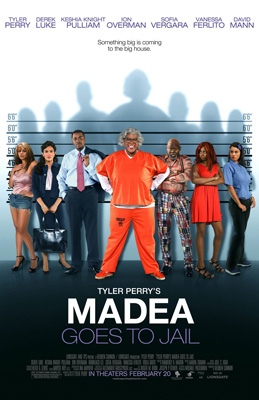Stars: 3 out of 5
Rating: PG-13 for mature thematic material, drug content, some violence and sexual situations.
Director: Tyler Perry
Release Date: February 20, 2009
Tyler Perry is ambitious. Writing, directing and acting as three different characters in his newest film, one cannot help but admire his passion. His newest film, “Madea Goes to Jail,” based on his play by the same name, is undeniably passionate.
Perry stars as the mischievous and irreverent Mabel “Madea” Simmons, an aggressively outrageous, pistol-packing matriarch who has lead the police on an OJ Simpson-esque highway chase and begun her downward spiral toward an eventual prison sentence.
In a separate but related story, Derek Luke plays DA Joshua Hardaway, a well-off defender of the weak with a lovely fiancée. By chance, he comes into contact with a college friend named Candy who makes her living as a lady of the night. This chance meeting throws his world into upheaval as his guilty past comes to fruition and he struggles to make things right between himself, his friend and his fiancée.
With two dramatic stories intersecting throughout, comedy and drama clash like clumsy titans skating on ice. The result is gawky and awkward, with scenes of gritty prostitution juxtaposed with goofy, weed-enhanced ramblings that feel lifted out of “Harold and Kumar.” Sure, the scenes have some dramatic weight and the weed jokes are mildly amusing, but the film cannot decide what genre it wants to be, and the consequential feeling is frustrating when the two are thrust together.
Using Madea as his mouthpiece to speak out for victims, Perry’s film clearly has a heart for social ills and people with flaws. His treatment of sinful characters is moving as he portrays them with sincerity and compassion. Being a Christian, Perry is unafraid to mix spiritual themes in with his work.
“There’s this huge separation of church and state,” he said. “I’m not afraid to mix the two. I’m not afraid to have a character say, ‘I am a Christian,’ or, ‘I believe in God,’ because I think they represent real people on this earth.”
Viola Davis brings a dignified gravity to a supporting role as she portrays a pastor named Ellen, who ministers to the prostitutes on the corner. She is a perfect example of a muscular Christian, one who has no fear and won’t accept being stepped on.
The characters in this dramedy are full of life and vigor, even if the actors themselves cannot always convey that same zeal. Most of the acting, aside from that of Perry’s larger-than-life Madea and Davis’ minister, is stale. The weight of the situations seems forced, and it shows.
It all ends in a nice, Hollywood ending that is telegraphed from the get-go, concluding with passionate kisses and sudden changes of allegiance that sap the film of its full potential.
Despite the mawkish tone and lack of transitions and clarity, this film has tender moments, goofy laughs and a sincere message of forgiveness that disregards the pulpit in favor of real characters.







